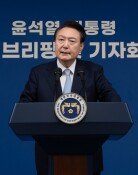After U.S. Negotiators Remarks, a Rift Is Seen Between Seoul and Washington
After U.S. Negotiators Remarks, a Rift Is Seen Between Seoul and Washington
Posted October. 08, 2005 07:57,
More people are becoming concerned about the basic differences in views between Seoul and Washington over the North Korean nuclear issue after U.S. assistant secretary of state for East Asian and Pacific Affairs and the chief negotiator to the six-party talks, Christopher Hill, remarked that South Koreas massive North Korean aid plan would make it difficult for the six-party talks to reach an agreement.
Hills remarks are not in line with the stance that even if South Korea and the U.S. are not on the same page over thorny issues such as Pyongyangs right to use its nuclear energy for peaceful purposes and the provision of a light-water reactor, the two countries ostensibly appear to have no fissures between them.
It is quite unusual for a U.S. high-ranking official to clarify his dissatisfaction with the Souths North Korean policies as in this case.
Differences in their viewpoints over the Norths nuclear program between Seoul and Washington are not new. Seoul believes that since Pyongyang agreed to dismantle its nuclear programs, now is right time to launch a massive assistance plan. Washingtons stance, however, is the Seouls plan to support Pyongyang should be used later as leverage to induce the North to scrap its nuclear programs.
In addition, given the current situation in which the North insists that it will not dismantle its nuclear programs without the provision of a light-water reactor, the U.S. believes that the Souths declaration of a massive aid plan for the North might lead to an increase in the Norths expectations about compensation as well as a reduction of the U.S. bargaining position.
In particular, Washington even casts doubts on Seouls stance, believing that Seoul, its ally, appears to want to act as a go-between between Washington and Pyongyang.
Hills criticism of the Souths North Korea policies during his speech hosted by the Center for Strategic and International Studies (CSIS) in Washington on September 29, also attended by diplomats from Seoul, might be interpreted as a message to hint at U.S. concerns about the current situation.
His remarks are also interpreted as targeting President Roh Moo-hyuns instructions in which the president ordered officials to come up with massive aid measures for the North right after the joint statement reached during the fourth round of the six-party talks last month. Thats why the South Korean government is taking Hills remarks seriously.
After the joint accord reached during the just-concluded round of talks, Hill said that contacts between Washington and Pyongyang through New York channels would be put into operation, but South Korean Foreign Minister Ban Ki-moon said, I know nothing about it. This shows that intelligence exchanges between Seoul and Washington are not proceeding smoothly.
Another case shows the possible rift between the two. The South Korean government has sought to invite Pyongyangs leadership to the Asia Pacific Economic Cooperation (APEC) summit slated for next month in Busan.
A South Korean government official flatly said yesterday, We are not considering over the issue, but the South has expressed its willingness to push ahead with this issue on several occasions. However, despite the fact that this issue might be a significant breakthrough in the process of resolving the North Korean nuclear impasse, no evidence was seen that Seoul consulted with Washington on this matter.
Some point out that if prior to Pyongyang-Washington negotiations, the rift between Seoul and Washington is not resolved, the road to a North Korean nuclear issue solution will be a bumpy one.
After Hills remarks, the U.S. State Department reaffirmed that South Korea significantly contributed to the results reached during the fourth round of the six-party talks. But if Seoul insists that there are no consultation problems between itself and the U.S., citing the U.S. State Departments remarks, the possibility cannot be ruled out that the differences in the two countries perspectives might create a serious situation.
Jong-Koo Yoon jkmas@donga.com
Headline News
- Harris ‘first female president’ vs. Trump ‘again 2016’
- N. Korea builds 11-meter rampart after road demolition
- Democratic Party eventually agrees to abolish financial investment income tax
- Drug smuggling is seized twice a day on average this year
- Surrounded by ‘uniforms,’ NHL’s first female coach ‘time-out’







